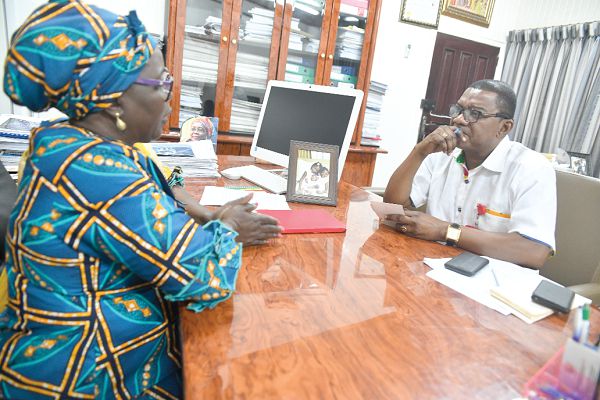
Parliament should expedite passage of amendment bill— Hajia Alima Mahama
With only five months to the referendum on the election of metropolitan, municipal and district chief executives (MMDCEs), Parliament is yet to pass the amendment bill of Article 243(1) which is currently before it.
In its current state, Article 243 states: “There shall be a district chief executive for every district who shall be appointed by the President, with the prior approval of not less than two-thirds majority of members of the assembly present and voting.”
Because of this article, the passage of the amendment bill by the Legislature is very critical to signal the country’s readiness to organise the referendum on the election of MMDCEs, scheduled for December this year.
Concerns of minister
This was one of the concerns of the Minister of Local Government and Rural Development, Hajia Alima Mahama, when the Daily Graphic asked her how her ministry was preparing for the referendum.
“The time is now and not later and we want Parliament to pass the amendment bill of Article 243(1) to send out a strong signal that MMDCEs will now to be elected.
“Parliament needs to send out that signal; it makes for a stronger position to push for the election of MMDCEs, as well as the amendment of other consequential articles, including Article 55,” she said.
Bi-partisan approach
According to the minister, Parliament should adopt a bi-partisan approach to allow for local democracy to deepen in the country.
That, she pointed out, would enhance participation at the local governance level and also ensure that the leadership of the local authorities was responsible to the citizenry.
“Our local governance system is key to accelerated national development efforts. If at the local level good governance practices and policies are non-existent or weak, development generally will be undermined or stifled,” she said.
“We need good, strong accountable structures at the local level to promote democracy,” she added.
Current decentralisation
In Hajia Mahama’s view, although significant progress had been made after many years of implementing the current decentralisation and local government system, there were a few grey areas that required improvement for participatory governance and local democracy to be deepened.
She cited the election of MMDCEs by the citizenry on a partisan basis, in tandem with the mode of electing national-level leaders, as one of such grey areas.
Close governance gap
To close that governance gap, it is recalled that some political parties, including the New Patriotic Party (NPP), the National Democratic Congress (NDC) and the Progressive People’s Party (PPP), in the run up to the 2016 general election, pledged in their manifestos to elect MMDCEs.
The MMDCEs have, since 1988, been appointed by the President, and currently Article 243 of the 1992 Constitution and Section 20 of the Local Governance Act 2016 (Act 936) provide for the position and give power to the President to appoint MMDCEs, with the prior approval of not less than two-thirds majority of the members of the district assemblies present and voting.
Need for change
According to Hajia Mahama, the need for a change in the mode of appointing MMDCEs was supported by a number of governance institutions, including the National Commission for Civic Education (NCCE) and the Centre for Democratic Development, Ghana (CDD-Ghana).
Furthermore, she said, the Constitution Review Commission Report on the 1992 Constitution and a survey conducted at the 2019 New Year School at the University of Ghana indicated support for electing MMDCEs on a partisan basis.
She said Ghana was not alone in pushing for the popular election of its local leaders, saying that “the popular election of local leaders by citizens has become one of the accepted best practices globally to deepen local democracy”.
She mentioned Uganda, Kenya, Namibia, The Gambia, Senegal, South Africa and Zambia as African countries doing so, adding that other countries on the same wavelength were the United Kingdom, the United States, France and Canada.
Hajia Mahama said the move by Ghana to elect its MMDCEs on a partisan basis was in line with global best practice in local governance and in accord with both democratic theory and public accountability.
Background
The government, in 2017, initiated a process to make the necessary constitutional, legal, policy and institutional changes required to give effect to the campaign promise to elect MMDCEs on a partisan basis.
In President Nana Addo Dankwa Akufo-Addo’s 2018 State of the Nation Address (SoNA) to Parliament, he stated his government’s commitment to elect MMDCEs on a partisan basis.
He again reiterated his commitment to ensure the election of MMDCEs in his 2019 SoNA to Parliament.
But to elect MMDCEs on a partisan basis requires the amendment of Article 243(1), which is a non-entrenched provision, and the amendment of an entrenched provision, Article 55(3), both of which Parliament is currently considering and is yet to pass.
